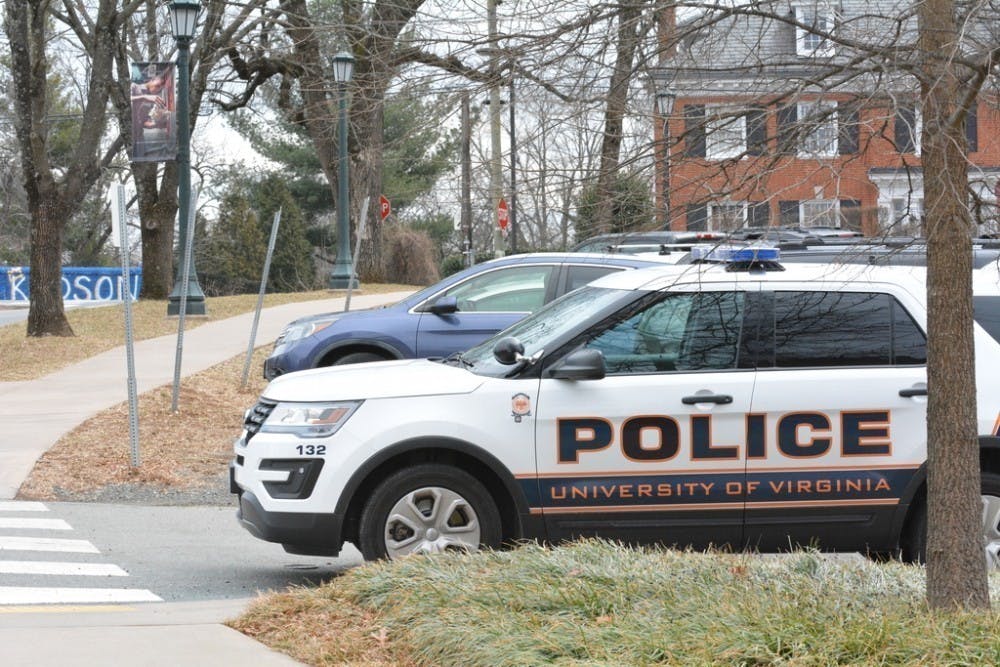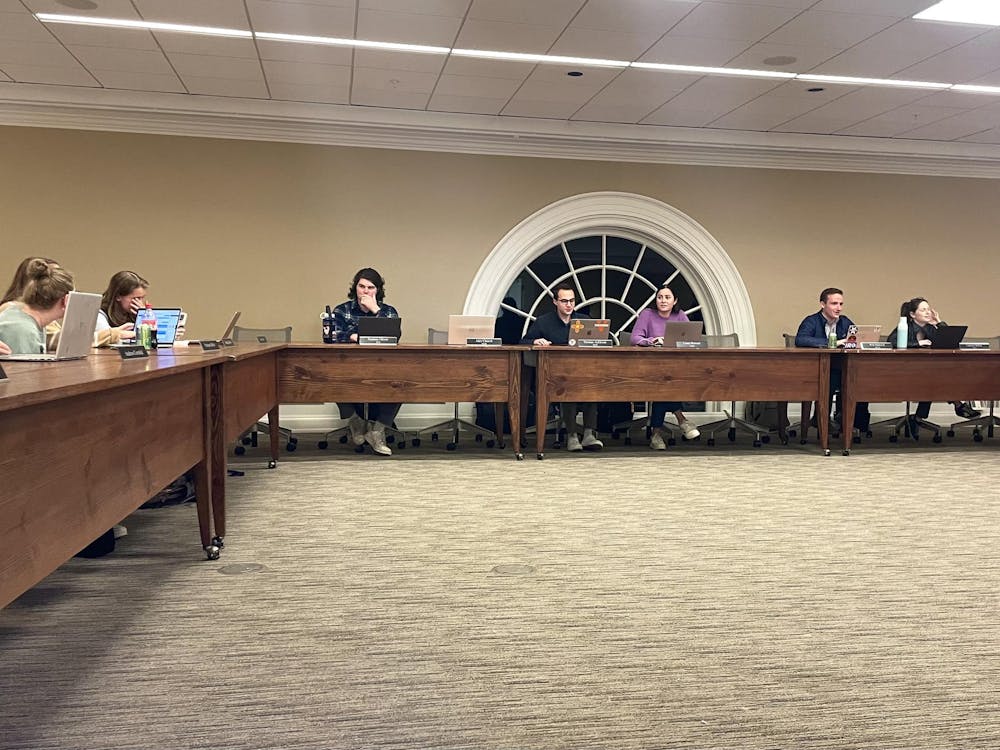The Student Police Advisory Board, established by Student Council in 2018, is currently collecting student input to help guide future meetings with the University Police Department in order to reconcile with growing dissatisfaction of police departments. The advisory board plans to meet with UPD at the end of the summer.
The Charlottesville community has actively participated in nationwide protests, with several local demonstrations since the killing of George Floyd three weeks ago by a Minneapolis police officer. During a local protest held June 13, demonstrators called for the defunding of the Charlottesville City, Albemarle County and University police departments,
Like CPD, UPD has also faced criticism in the past for its response to the white supremacist demonstrations of Aug. 11, 2017 on the Lawn, as stated in a report by Tim Heaphy, a former U.S. Attorney and current University Counsel. The department was also criticized in August 2018 when a large mass of police congregated on Grounds during a U.Va. Students United rally, a protest organized by students at Brooks Hall on the one-year anniversary of the Unite the Right rally.
What many saw as an egregious mishandling on behalf of UPD of the August 2017 white supremacist demonstration on Grounds — coupled with different incidences on biased policing — pushed then third-year College student Alex Cintron to prioritize a student police advisory board as a major tenet of his campaign platform.
When Cintron began his term as Student Council president in spring 2018, the creation of the advisory board was “one of the first things to do,” Cintron told The Cavalier Daily.
The goal of the nascent board was complete community buy-in from administrators and students — particularly from marginalized student communities on Grounds. The board was also written into the Council’s bylaws — ensuring that the initiative wouldn't come and go with Cintron’s presidency.
“I wanted to make it Student Council proof,” Cintron said.
In November 2018, the student advisory board held its first meeting, featuring a discussion about how the program can encourage engagement between students and UPD.
Cintron characterized University administration as “very willing for students to drive the conversation on the board.” In particular, Student Council had formed a productive relationship with Tommye Sutton and Gloria Graham, who at the time served as University Police Chief and associate vice president for safety and security, respectively.
The pair resigned in fall 2019 — the circumstances of which remain unknown to the public.
“Unfortunately, the gods have said, ‘we're going to put another obstacle in front of this board,’” Cintron said. “Fortune has removed the two principal investors in this board which were Gloria Graham and Tommye Sutton.”
Former Charlottesville Police Chief Tim Longo began his tenure as interim UPD Chief Oct. 1 before being promoted to permanent chief as well as vice president of safety and security Feb. 13.
Following Sutton’s resignation, in fall of 2019, the Safety and Wellness Committee began working to assemble a new Student Police Advisory Board to build on the work of the previous board.
Sutton previously described his plan to improve the relationship between UPD and the student body during a Student Council meeting in 2018.
“We want to develop a relationship with students well before they need us, so that we’re on a first-name basis,” Sutton said at the time. “All of that’s about to change so that, if you have any questions, you’ll know how to find my email address, or you’ll know how to find my office phone to give me a call. Because we are truly here to serve you.”
The new board was restarted to enact action by putting together a Selections Committee in charge of assembling the board to address any problems between students and the University Police Department.
Now, given the current political climate as police reform and abolition movements grow in the wake of police brutality and racist policing, the Student Police Advisory Board has decided that it needs to resolve the tension amongst UPD and students by asking students directly for their advice on how to facilitate engagement between them.
Emily Leventhal — a rising second-year College student and chair of the Safety and Wellness Committee — and James Roberts — a rising third-year Engineering student and Student Police Advisory Board co-chair— noted that the board was originally created as a way for students to voice their opinions and ideas directly to UPD.
Leventhal explained that since the start of the board in fall 2018, the board has met with UPD five times in the past two years. However, based on recent acts of racism and police brutality in the country, the advisory board feels that change cannot occur within a policing system that lacks accountability outside of its own organization.
Therefore, they are hoping to push University administration to establish this kind of accountability within UPD. In order to do so, they are in the process of trying to find and add administrators to the advisory board, though they do not have a set individual picked yet.
Additionally, they are working to establish a reporting system so that students who have negative experiences with UPD can report it directly to administration, specifically to the Office for Diversity, Equity and Inclusion.
Since the Student Police Advisory Board is relatively new, and largely due to the disruption of COVID-19, Leventhal and Roberts said that they were not very active this past year. But because of the recent calls for communities to re-evaluate their relationships with the police, they have sped up their efforts to revamp the board and get started on its work.
Longo told The Cavalier Daily his experience with the advisory board has been limited since his term began as UPD Chief in October, only meeting once. But he said that he is looking forward to the new changes being made to the board, for example the inclusion of administrators on the board.
“I welcome the addition of faculty to the Board,” he said. “Given my very brief exposure to the Board and its limited duration, I don't have a sense as to whether this had ever been proposed.”
Longo also explained that he had not had a chance to address concerns between students and UPD as the board only met once since he became police chief, a few days prior to spring break in March.
“There were no criticisms offered, but we discussed a communications flow to ensure that concerns would be heard and addressed in a timely fashion and with Board engagement,” Longo said.
After putting out the link asking for students’ experiences with UPD, Student Council has so far gained 54 responses from individuals sharing their experiences with and opinions about University police.
According to Leventhal, the students who responded to the survey overwhelmingly supported defunding UPD and re-allocating those funds to other health and safety resources, such as Counseling and Psychological Services. Leventhal noted that she does not know the logistics behind UPD funding, which she says is in part due to a lack of transparency from UPD. Student Council is actively investigating the questions of how UPD is funded and how much funding it receives.
According to Leventhal, the responses showed students telling personal stories about the department harassing people of color, using unnecessary force and repeatedly ignoring complaints of sexual assault.
“Students are angry about the lack of transparency and accountability within the department, the over-policing of students of color and the current inadequate system for resolving sexual violence cases,” Leventhal said. “Many students said they felt threatened and anxious around officers whose job it is to make them feel safe. Ultimately, they felt that UPD actively looks to intimidate and punish students, rather than simply keep them safe.”
Leventhal and Roberts stated that the advisory board is planning to organize this feedback and present it to UPD at their next meeting by the end of summer. In order to give more individuals the opportunity to maintain an active role advocating for change in student policing, they are also reopening the application to students who wish to serve on the board within the week. The application is open from June 22 to July 13 before midnight. Students interested in applying can find more information on the Student Council website or on their social media accounts.
“In order for the monumental change that is needed at our University to occur, administrators and the University police must commit to meeting more frequently through SPAB as well as be more receptive to students’ ideas and opinions regarding UPD,” Leventhal said.
The work that they plan to do in the future is outlined in the Student Council’s Statement of Solidarity. Several communities on Grounds representing BIPOC students — such as Black Student Alliance, Asian Leaders Council and Indian Student Association — have also issued their own demands.
In BSA’s statement regarding unfulfilled demands, students called on the University to “follow the example of divestment and demilitarization of the police, set by the University of Minnesota,” among other suggestions.
Through the advisory board, Leventhal and Roberts hope to create a space for members of these communities to voice their concerns and issue their demands to administrators and members of UPD.
“There will be unprecedented pressure on the University to listen to students and make much-needed changes, and students will not stop advocating for change until our demands are met,” Leventhal said of the board's redevelopment. “I am hopeful that if we effectively organize, we can help to minimize the blatant instances of racial injustice that continue to occur at our University.”





